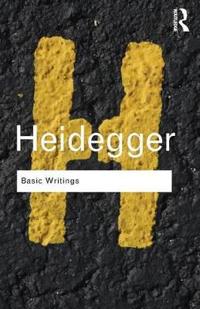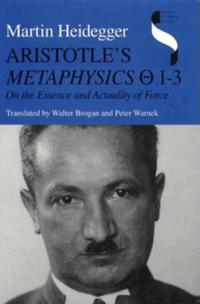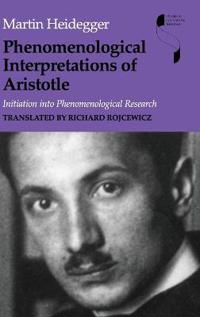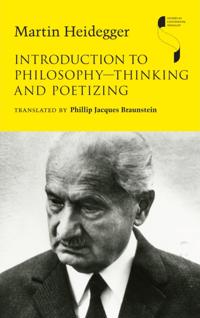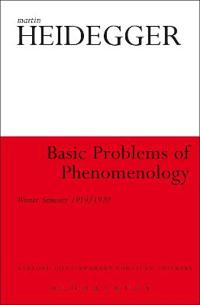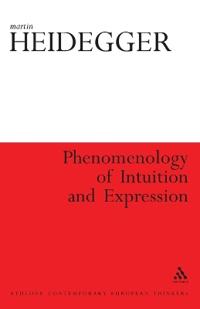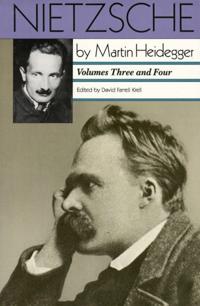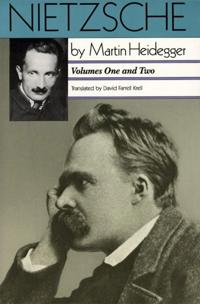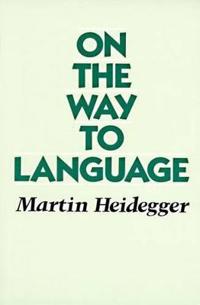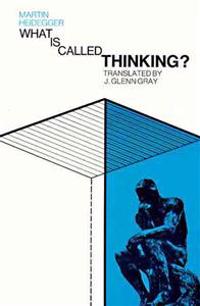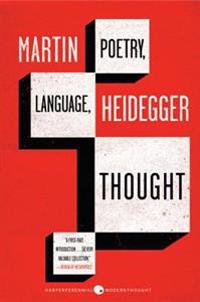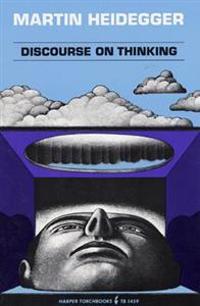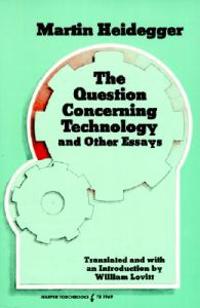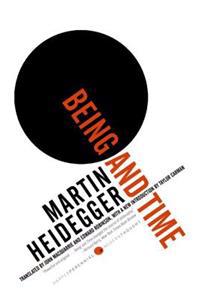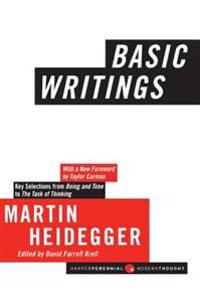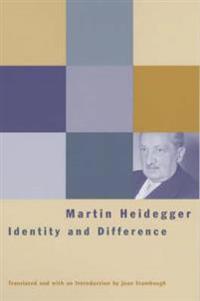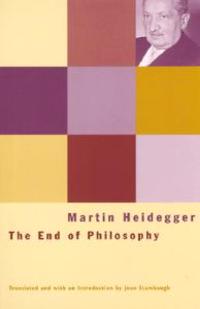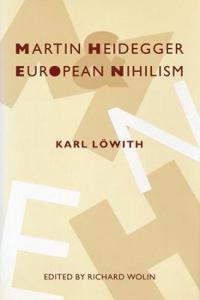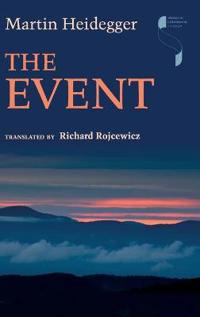Basic Writings: Martin Heidegger (Storpocket)
avMartin Heidegger
ISBN: 9780415584821 - UTGIVEN: 201008Few philosophers have had more influence on the shape of western philosophy after 1900 than Martin Heidegger. "Basic Writings" offers a full range of this profound and controversial thinker's writings in one volume, including: "The Origin of the Work of Art"; "The introduction to Being and Time"; "W[...]
Heidegger Gesamtausgabe Bd. 23. Geschichte der Philosophie von Thomas von Aquin bis Kant (Häftad)
avMartin Heidegger
ISBN: 9783465035039 - UTGIVEN: 200609Die Vorlesung "Geschichte der Philosophie von Thomas von Aquin bis Kant" wurde von Martin Heidegger im Wintersemester 1926/27 an der Universität Marburg an der Lahn gehalten. Sie fällt somit in die letzte Phase der Ausarbeitung von "Sein und Zeit". Einem einleitenden Teil mit der Anzeige des V[...]
Martin Heidegger (Inbunden)
avHeinrich Heidegger, Pierfrancesco Stagi
ISBN: 9783839213360 - UTGIVEN: 2012-07Aristotle's Metaphysics th 1-3 (Inbunden)
avMartin Heidegger, Walter Brogan, Martin Heidegger
ISBN: 9780253329103 - UTGIVEN: 1995-11Martin Heidegger's reading of Aristotle was one of the pivotal influences in the development of his philosophy. First published in German in 1981 as volume 33 of Heidegger's collected works, this book translates a lecture course he presented at the University of Freiburg in 1931. Heidegger's careful[...]
Phenomenological Interpretations of Aristotle (Inbunden)
avMartin Heidegger, Richard (TRN) Rojcewicz, Martin Heidegger
ISBN: 9780253339935 - UTGIVEN: 2001-12"Phenomenological Interpretations of Aristotle", the text of a lecture course presented at the University of Freiburg in the winter of 1921 and 1922, was first published in 1985 as volume 61 of Heidegger's collected works. Preceding "Being and Time", the work shows Heidegger attempting, through the [...]
Introduction to Philosophy-Thinking and Poetizing (Inbunden)
avMartin Heidegger, Phillip Jacques (TRN) Braunstein, Martin Heidegger
ISBN: 9780253355911 - UTGIVEN: 2011-01First published in 1990 as the second part of volume 50 of Heidegger's Complete Works, Introduction to Philosophy presents Heidegger's final lecture course given at the University of Freiburg in 1944 before he was drafted into the German army. While the lecture is incomplete, Heidegger provides a cl[...]
Basic Problems of Phenomenology (Häftad)
avMartin Heidegger, Martin Heidegger, Scott Campbell
ISBN: 9781441103604 - UTGIVEN: 201212Basic Problems of Phenomenology presents the first English translation of Martin Heidegger's early lecture course from the Winter of 1919/1920, in which he attempts to clarify phenomenology by looking at the phenomenon of life, which he sees as the primary area of research for phenomenology. Heidegg[...]
Phenomenology of Intuition and Expression (Pocket)
avMartin Heidegger, Tracy (TRN) Colony, Martin Heidegger
ISBN: 9781847064448 - UTGIVEN: 2010-08This is the first English translation of one of Heidegger's most important early lecture courses, including his most extensive treatment of the topic of destruction. "Phenomenology of Intuition and Expression" is a crucial text for understanding the early development of Heidegger's thought. This lec[...]
Nietzsche (Pocket)
avMartin Heidegger
ISBN: 9780060637941 - UTGIVEN: 199102A landmark discussion between two great thinkers, vital to an understanding of twentieth-century philosophy and intellectual history.[...]
Nietzsche (Pocket)
avMartin Heidegger, David Farrell Krell, David Farrell Krell
ISBN: 9780060638412 - UTGIVEN: 199102A landmark discussion between two great thinkers, vital to an understanding of twentieth-century philosophy and intellectual history.[...]
On the Way to Language (Häftad)
avMartin Heidegger
ISBN: 9780060638597 - UTGIVEN: 200305In this volume Martin Heidegger confronts the philosophical problems of language and begins to unfold the meaning begind his famous and little understood phrase "Language is the House of Being."The "Dialogue on Language," between Heidegger and a Japanese friend, together with the four lectures that [...]
What Is Called Thinking (Pocket)
avMartin Heidegger
ISBN: 9780060905286 - UTGIVEN: 196306"For an acquaintance with the thought of Heidegger, What Is Called Thinking? is as important as Being and Time. It is the only systematic presentation of the thinker's late philosophy and . . . it is perhaps the most exciting of his books."--Hannah Arendt[...]
Poetry, Language, Thought (Häftad)
avMartin Heidegger
ISBN: 9780060937287 - UTGIVEN: 200111Essential reading for students and anyone interested in the great philosophers, this book opened up appreciation of Martin Heidegger beyond the confines of philosophy to the reaches of poetry. In Heidegger's thinking, poetry is not a mere amusement or form of culture but a force that opens up the re[...]
Discourse on Thinking: A Translation of Gelassenheit (Häftad)
avMartin Heidegger
ISBN: 9780061314599 - UTGIVEN: 196911The Question Concerning Technology, and Other Essays (Häftad)
avMartin Heidegger
ISBN: 9780061319693 - UTGIVEN: 198201"To read Heidegger is to set out on an adventure. The essays in this volume--intriguing, challenging, and often baffling to the reader--call him always to abandon all superficial scanning and to enter wholeheartedly into the serious pursuit of thinking...."Heidegger is not a 'primitive' or a 'romani[...]
Being and Time (Häftad)
avMartin Heidegger
ISBN: 9780061575594 - UTGIVEN: 200807"What is the meaning of being?" This is the central question of Martin Heidegger's profoundly important work, in which the great philosopher seeks to explain the basic problems of existence. A central influence on later philosophy, literature, art, and criticism--as well as existentialism and much o[...]
Basic Writings (Häftad)
avMartin Heidegger, Taylor Carman, David Farrell Krell
ISBN: 9780061627019 - UTGIVEN: 200811Basic Writings is the finest single-volume anthology of the work of Martin Heidegger, widely considered one of the most important modern philosophers. Its selections offer a full range of the influential author's writings--including "The Origin of the Work of Art," the introduction to Being and Time[...]
The Question Concerning Technology: And Other Essays (Häftad)
avMartin Heidegger
ISBN: 9780062290700 - UTGIVEN: 2013-12The advent of machine technology has given rise to some of the deepest problems of modern thought. Featuring the celebrated essay "The Question Concerning Technology," this prescient volume contains Martin Heidegger's groundbreaking investigation into the pervasive "enframing" character of our under[...]
Identity and Difference (Häftad)
avMartin Heidegger
ISBN: 9780226323787 - UTGIVEN: 2002-06"Identity and Difference consists of English translations and the original German versions of two little-known lectures given in 1957 by Martin Heidegger, "The Principle of Identity" and "The Onto-theo-logical Constitution of Metaphysics." Both lectures discuss the difficult problem of the nature of[...]
The End of Philosophy (Häftad)
avMartin Heidegger
ISBN: 9780226323831 - UTGIVEN: 200306Joan Stambaugh's translations of the works of Heidegger, accomplished with his guidance, have made key aspects of his thought and philosophy accessible to readers of English for many years. "The End of Philosophy" is one in a series of Heidegger's books newly reissued, following "Identity and Differ[...]
Martin Heidegger and European Nihilism (Övrig)
avKarl Lowith
ISBN: 9780231084062 - UTGIVEN: 1995-07-31Written by a former student of Heidegger, this book examines the relationship between the philosophy and the politics of a celebrated teacher and the allure that Nazism held out for scholars committed to revolutionary nihilism.[...]
Martin Heidegger and European Nihilism (Häftad)
avKarl Lowith
ISBN: 9780231084079 - UTGIVEN: 199803Written by a former student of Heidegger, this book examines the relationship between the philosophy and the politics of a celebrated teacher and the allure that Nazism held out for scholars committed to revolutionary nihilism.[...]
Contributions to Philosophy (Inbunden)
avMartin Heidegger
ISBN: 9780253001139 - UTGIVEN: 201207Martin Heidegger's Contributions to Philosophy reflects his famous philosophical "turning." In this work, Heidegger returns to the question of being from its inception in Being and Time to a new questioning of being as event. Heidegger opens up the essential dimensions of his thinking on the histori[...]
The Event (Inbunden)
avMartin Heidegger
ISBN: 9780253006868 - UTGIVEN: 201303Martin Heidegger's The Event offers his most substantial self-critique of his Contributions to Philosophy: Of the Event and articulates what he means by the event itself. Richard Rojcewicz's elegant translation offers the English-speaking reader intimate contact with one of the most basic Heideggeri[...]

